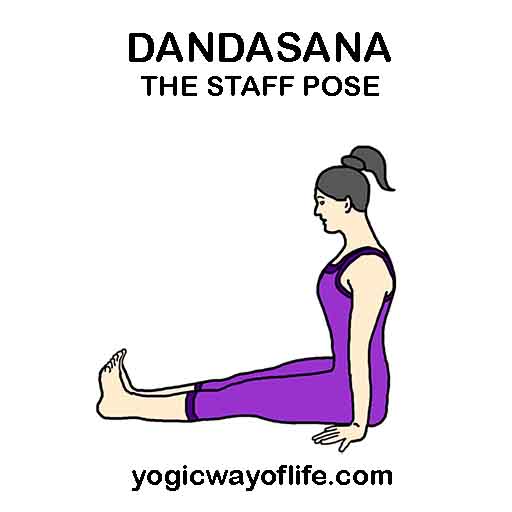Dandasana or the Staff Pose is a simple sitting pose which forms the starting position for most other sitting yogic postures. In Sanskrit, Danda means a stick or staff and Asana means a pose.
How to do Dandasana (The Staff Pose)?
- Sit on the floor and stretch your legs in front of you.
- Place the hands on the sides on the floor.
- Bring the two legs together with both the feet touching each other.
- Put slight pressure on the floor with your palms and raise your spine up. The back and the head should be held straight and gaze forward.
- Flex the feet backwards so feel a slight tug under the legs muscles.
- Broaden the chest so that the two shoulder blades are pulled towards each other in the back. If you have a weak back, you may use the support of the wall to do this pose.
- Push the thighs to the floor and make sure the legs are straight. If your hamstrings are tight, then you may use a blanket under your legs.
- Breathe normally and maintain this position for as long as you wish.
Benefits of Dandasana (The Staff Pose)
- Dandasana is a starting pose for most of the other sitting postures. For example, if you want to perform Paschimottanasana or the forward bend pose, you have to start with this asana.
- It helps to strengthen the muscles of the back and corrects minor postural defects.
- Perfecting this asana gives you the strength and steadiness to do more advanced yogic poses.
- The muscles of the chest and abdomen is stretched and strengthened.
- Maintaining the pose for longer durations can remove stiffness of the lower back muscles.
- It can improve digestion.
- It can remove fatigue in the leg muscles.
- It increases the flexibility of the lower back and hips.
Contraindications for Dandasana (The Staff Pose)
- Dandasana is a beginner’s pose. It does not have any known contraindications for a normal healthy person. However, those who suffer from weak back should try to do this with the support of the wall.
- Use a blanket under the legs if your hamstrings are too tight.

